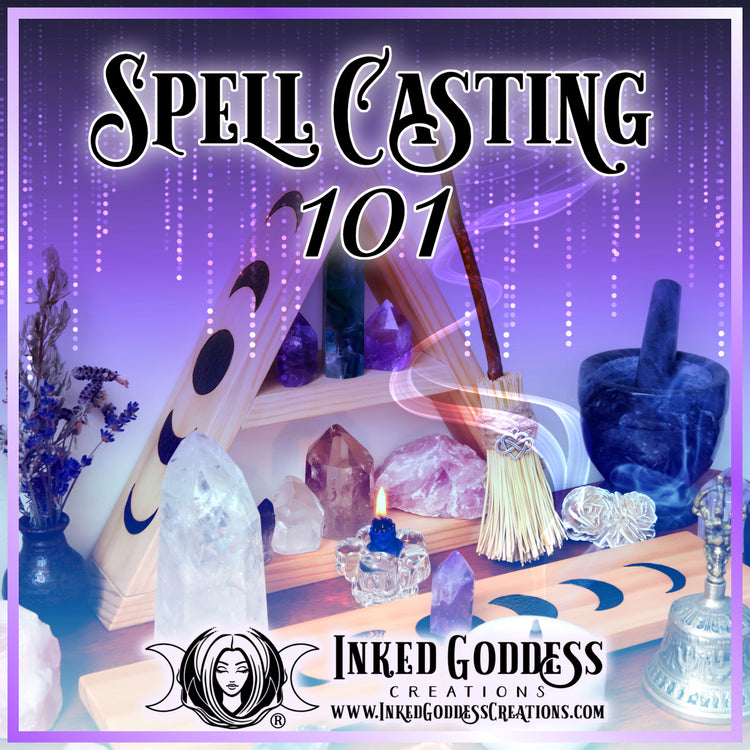Spell Casting 101

If the idea of casting a spell brings to mind a cinematic image of three sisters over a boiling cauldron, just know that we’re big fans of “Hocus Pocus” too! However, you don’t have to be super fancy about your spells. As you continue reading this post, there’s one thing I want you to remember: You are the magick. Your intention and your energy are what activate a spell, so even if you don’t have a basic tool or ingredient, you can still cast spells. Let’s dive in!
Basic Spell Tools
It’s nice to have some tools at hand when casting spells, but feel free to get creative. For example, a thrifted wine glass can become your altar chalice and a stick found on a nature walk can serve as a wand. If you’d like to have spell casting tools, here’s a list of good supplies to have on hand:
- Athame or magickal blade: This is a symbolic knife, so it doesn’t even have to be sharp. Some options include selenite or resin athames.
- An actual cutting instrument such as scissors or a bolline. A bolline is a knife that’s used for cutting ingredients.
- Cauldron: Choose a cauldron that fits your aesthetic and practices. For instance, if you’re a celestial witch, you may find a silver metal bowl works better for you than a wrought iron cauldron.
- Book of Shadows. Look, I love the giant Book of Shadows from “Charmed” as much as the next witch, but you can use something as simple as a spiral notebook to keep track of your magickal notes. It’s always a good idea to write down ingredients, incantations, and results of a spell for future reference.
- A dedicated broom or besom for spiritual cleaning.
- A wand. This can be a beautifully carved wand found at a witchy bazaar, a found stick on a nature walk, or anything in between. If you’re a sea witch, a piece of driftwood might be exceptionally powerful for you.
- Crystals and gemstones.
- Chalice or liquid vessel of some sort. As I mentioned above, it can be something thrifted or gifted from your kitchen to serve as a magickal tool.
- Candles: All white will serve any spell need, but feel free to get fancy if you’d prefer!
- An altar space.
Setting Up Your Space
Whether you’re a kitchen witch or a private solitary witch, setting your space up for magick is important. Start by cleansing the space with your besom, a bell, or a spray or smoke cleanse.
Next, protect the space by casting a circle and bless your tools. A little salt water on your knife and cutting board before your kitchen spell can cleanse and protect the space. Outside of the kitchen, the same salt water, a little Florida water, essential oils, or just your finger and an intention can be used to draw a protective sigil on the surface of your altar space.
I like to light a candle as well – a white votive or tea light will do just fine if you don’t have a color specific to your spell.
Set Your Intention
Before you begin, set your intention for the spellcasting session. Connect with a patron deity or your spirit guides if that resonates.
Recite or Write Your Incantation
Here’s where you can have a lot of fun with your spellcasting. If you want prosperity, write what you’d like on a Bay Leaf (be super specific about what it is you want and how you want to get it to avoid accidents!). For spell jars, write the name of the person the spell is for or the intention on a slip of paper. When casting a spell where no writing is involved, simply state it aloud.
Don’t rush through the spellcasting process. Enjoy being in this powerful, magickal space. This is also a time to listen to the messages you receive from your spirit guides or through your intuition. You’ll know best when you’re ready to begin finishing the spell.
“Cast” It Off
To finish your spell, send it off to the Universe or the Earth. Spell jars and protection spells can be stored for safety. Some spells are best when kept until they complete their magick on their own – such as a prosperity or love spell. You can burn your herbs or a slip of paper using your candle, or you can simply release it to the Universe to carry it where it needs to go.
Finish things by blowing out or snuffing out your candle. There’s a lot of debate on this one, so I always recommend doing what works best for you. Sometimes, I snuff out a candle to keep the magick within the spell space. Other times, I want the smoke from a blown out candle to carry my intention through the air.
Close Your Spell
A final “thank you” to your guides or deities is always a good idea. It’s also wise to clean up after your spell and safely store any ingredients or spell elements that shouldn’t fall into the wrong hands (or into a familiar’s grasp).
I also like to call my energy back to myself and release any energy that doesn’t serve me. One of the easiest ways to do that is just to visualize your golden energy returning to you. You can also visualize any energy that isn’t yours gently floating away.
